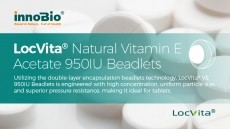Vitamin K2: Study unlocks which forms have higher bioavailability

The results indicate that the “nutritional values of vitamin K2 homologues should be differentiated with regard to bioavailability and efficacy,” wrote scientists from J-Oil Mills, Inc., in Japan, University Maastricht in The Netherlands, and Kagawa Nutrition University in Japan in the Nutrition Journal.
K forms
There are two main forms of vitamin K: phylloquinone, also known as phytonadione, (vitamin K1) which is found in green leafy vegetables such as lettuce, broccoli and spinach, and makes up about 90% of the vitamin K in a typical Western diet; and menaquinones (vitamins K2), which make up about 10% of Western vitamin K consumption and can be synthesised in the gut by microflora.
Menaquinones (MK-n: with the n determined by the number of prenyl side chains) can also be found in the diet; MK-4 can be found in animal meat, MK-7, MK-8, and MK-9 are found in fermented food products like cheese, and natto is a rich source of MK-7.
“Because all vitamin K homologues can be converted to MK-4 in vivo, MK-4 is considered to have specific functions other than gamma-carboxylation of vitamin K-dependent proteins,” explained the researchers.
“In this study, we demonstrated that a nutritional dose of MK-7 is well absorbed in human, and significantly increases serum MK-7 levels, whereas MK-4 had no effect on serum MK-4 levels.
Study details
The researchers tested the effects of a single dose of MK-4 (420 micrograms) or MK-7 (420 micrograms) consumed with a standardized breakfast in ten health Japanese women. Results showed that MK-7 was well absorbed and was measurable in serum samples up to 2 days after consumption.
On the other hand, MK-4 was not measured in any of the women at any time, they said.
A second study that used consecutive administration of MK-4 (60 micrograms) or MK-7 (micrograms) for seven days again with ten health Japanese women indicated that MK-4 again did not increase MK-4 levels. On the other hand, MK-7 was found to increase MK-7 levels.
“The current study shows that MK-4 has a poor bioavailability at a nutritional level dose, whereas MK-7 is well absorbed and detectable in the blood at nutritional levels,” wrote the researchers.
“In a previous rat study from our group [Vitamins (Japan) 2007, Vol. 81, pp. 377-381], the intake of a nutritional dose of MK- 4 did not increase the MK-4 levels in extrahepatic tissues, whereas MK-7 significantly increased MK-4 in extrahepatic tissues,” they added.
“Thus, MK-7 is a better supplier for MK-4 in vivo than MK-4 itself.”
Source: Nutrition Journal
2012, 11:93 doi:10.1186/1475-2891-11-93
“Comparison of menaquinone-4 and menaquinone-7 bioavailability in healthy women”
Authors: T. Sato, L.J. Schurgers, K. Uenishi
















